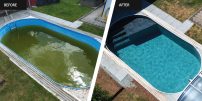How is the industry faring in the battle against RWIs? Is it complying with local and federal health laws? Soon-to-be published findings from a research project that polled health officials nationwide should provide some answers.
Accu-Tab Chlorination System, part of Atlanta-based Axiall Corp.’s Water Treatment Products division, partnered with the National Association of City and County Health Officials to conduct a study designed to determine if and where our nation’s public pools are falling short of compliance.
NACCHO, which represents 2,800 health departments across the United States, polled inspectors on their protocols and experiences in examining recreational water facilities.
Preliminary findings suggest that we could do better.
• 75 percent of respondents reported a commercial pool being shut down by their agency within the past two years.
Of those that reported a shutdown …
• 90 percent attributed it to low sanitizing levels
• 61 percent said it was due to pH being out of balance
• 53 percent attributed it to cloudy water
None of this came as a shock to Barry Grisez. “That sounds pretty close to what you’d normally see,” said the program manager at Ohio’s Cuyahoga County Board of Health.
The survey also found that — and this won’t come as a surprise — apartment complexes are some of the biggest offenders. It’s well known in the industry that homeowners associations are routinely behind the curve when it comes to compliance. Now we’ve got hard data. Fifty-four percent of respondents reported that two out of three apartment complex inspections yield violations.
The final report also will delve into compliance with the Virginia Graeme Baker Pool and Spa Safety Act, as well as reveal what implications the upcoming Model Aquatic Health Code will present.
“Anything that comes up in that survey, I’ve got to imagine, has to in some way be addressed through the Model Aquatic Health Code,” Grisez said.
The upcoming report is a follow-up to a similar study Accu-Tab conducted in 2008, but this one promises to be more comprehensive.
“There’s a lot of anecdotal information out there,” said Frank Schiffman, senior marketing manager for Axiall’s water treatment products group. “This is far from anecdotal.”
The full study will arm operators and inspectors with information that can be put into practice to prevent RWIs and lawsuits.
“This really is serving as baseline data for us and for our members, and how we move forward in [combating] recreational water illness,” said NACCHO’s Jennifer Li, director for environmental health, and health and disability.
NACCHO and Accu-Tab will present the findings at the National Swimming Pool Foundation’s World Aquatic Health Conference in Portland, Ore., on Oct. 8-10.




